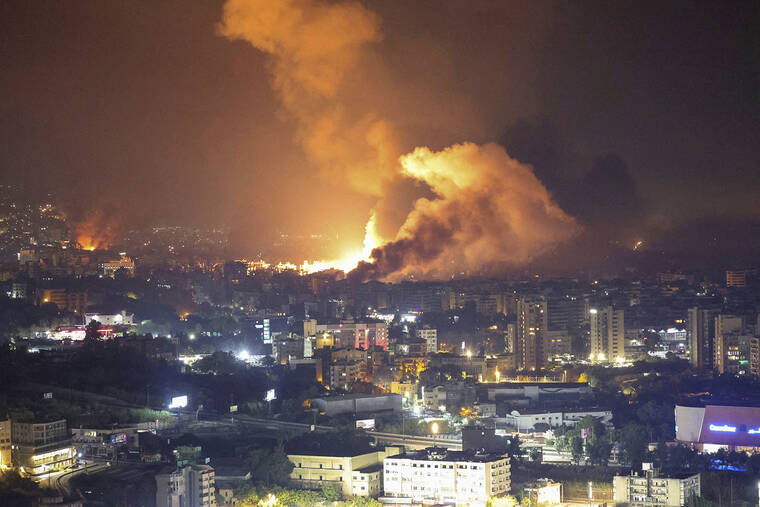Israeli airstrikes rock Beirut, Hezbollah command center hit
BEIRUT/JERUSALEM — A wave of air raids hit Beirut’s southern suburbs early on Saturday as Israel stepped up attacks on Hezbollah, after a massive strike on the Iran-backed movement’s command centre that apparently targeted leader Hassan Nasrallah.
Reuters witnesses heard more than 20 airstrikes before dawn on Saturday. Abandoning their homes in the southern suburbs, thousands of Lebanese congregated in squares, parks and sidewalks in downtown Beirut and seaside areas.
ADVERTISING
“They want to destroy Dahiye, they want to destroy all of us,” said Sari, a man in his 30s who gave only his first name, referring to the suburb he had fled after an Israeli evacuation order. Nearby, the newly displaced in Beirut’s Martyrs Square rolled mats onto the ground to tried to sleep.
An unprecedented five hours of continuous strikes early on Saturday followed Friday’s attack, by far the most powerful by Israel on Beirut during nearly a year of war with Hezbollah. It marked a sharp escalation of a conflict that has involved daily missile and rocket fire between the two sides.
The latest escalation has sharply increased fears the conflict could spiral out of control, potentially drawing in Iran, Hezbollah’s principal backer, as well as the United States.
There was no immediate confirmation of Nasrallah’s fate after Friday’s heavy strikes, but a source close to Hezbollah told Reuters he was not reachable. The Lebanese armed group has not made a statement.
Israel has not said whether it tried to hit Nasrallah, but a senior Israeli official said top Hezbollah commanders were targeted.
“I think it’s too early to say… Sometimes they hide the fact when we succeed,” the Israeli official told reporters when asked if the strike on Friday had killed Nasrallah.
Earlier, a source close to Hezbollah told Reuters that Nasrallah was alive. Iran’s Tasnim news agency also reported he was safe. A senior Iranian security official told Reuters that Tehran was checking his status.
The Israeli military said in a statement that it had killed the commander of Hezbollah’s missile unit, Muhammad Ali Ismail, and his deputy Hossein Ahmed Ismail.
Hours before the latest barrage, Israeli Prime Minister Benjamin Netanyahu told the United Nations that his country had a right to continue the campaign.
“As long as Hezbollah chooses the path of war, Israel has no choice, and Israel has every right to remove this threat and return our citizens to their homes safely,” he said.
Several delegations walked out as Netanyahu approached the lectern. He later cut short his New York trip to return to Israel.
Lebanese health authorities confirmed six dead and 91 wounded in the initial attack on Friday — the fourth on Beirut’s Hezbollah-controlled southern suburbs in a week and the heaviest since a 2006 war.
The toll appeared likely to rise much higher.
There was no word on casualties from the later strikes. More than 700 people were killed in strikes over the past week, authorities said.
Hezbollah’s al-Manar television reported seven buildings were destroyed. Security sources in Lebanon said the target was an area where top Hezbollah officials are usually based.
Hours later, the Israeli military told residents in parts of Beirut’s southern suburbs to evacuate as it targeted missile launchers and weapons storage sites it said were under civilian housing.
Hezbollah denied any weapons or arms depots were located in buildings that were hit in the Beirut suburbs, the Lebanese armed group’s media office said in a statement.
Alaa al-Din Saeed, a resident of a neighbourhood Israel identified as a target, told Reuters he was fleeing with his wife and three children.
“We found out on the television. There was a huge commotion in the neighbourhood,” he said.
The family grabbed clothes, identification papers and some cash but were stuck in traffic with others trying to flee.
“We’re going to the mountains. We’ll see how to spend the night — and tomorrow we’ll see what we can do.”
Around 100,000 people in Lebanon have been displaced this week, increasing the number uprooted in the country to well over 200,000.


